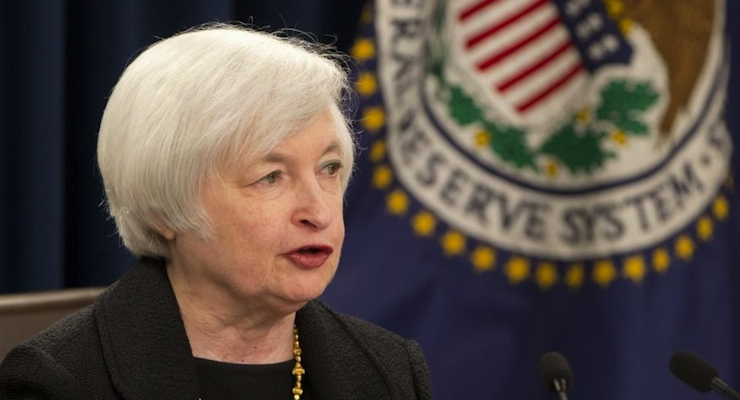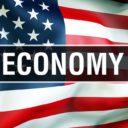

Federal Reserve Chair Janet Yellen. (Photo: Reuters)
We’ve been suffering through the weakest recovery since the Great Depression. Labor force participation hasn’t recovered and median household income is stagnant. So how are our benevolent and kind overseers in Washington responding?
Are they reducing the burden of spending? Nope, they just busted the spending caps. Are they cutting back on red tape? No, they’re moving in the other direction. Are they lowering taxes? With Obama in the White House, that’s not even a serious question.
But that doesn’t mean all the people in Washington is sitting on their collective hands. The folks at the Federal Reserve have been trying to goose the economywith an easy-money policy.
Unfortunately, as I argue in this recent interview, that’s not a recipe for success.
[brid video=”20284″ player=”1929″ title=”CATO Economist Dan Mitchell on December Rate Hike from the Fed”]
At best, an easy-money policy is ineffective, akin to “pushing on a string.” At worst, it creates bubbles and does serious damage.
Yet if you don’t like the Fed trying to manipulate the economy, you’re often perceived as a crank. And if you’re an elected official who questions the Fed’s actions, you’re often portrayed as some sort of uninformed demagogue.
I explored this issue today in The Federalist. In my column, I defended Senators Rand Paul and Ted Cruz.
Rand Paul and Ted Cruz…deserve credit for criticizing the Federal Reserve. …This irks some folks, who seem to think Fed critics are knuckle-dragging rubes and yahoos with a superstitious fealty to the gold standard.
This isn’t a debate over the gold standard, per se, but instead of fight over monetary Keynesianism vs. monetary rules.
The dispute isn’t really about a gold standard, but whether the Federal Reserve should have lots of discretionary power. …On one side are the advocates of…the monetary component of Keynesian economics. Proponents explicitly want the Fed to fine-tune and micromanage the economy. …On the other side are folks who believe in rules to limit the Fed’s powers…because they believe discretionary power is more likely to give us bad results such as higher price inflation, volatility in output and employment, and financial instability.
And the Joint Economic Committee is on the side of rules. Here’s an excerpt from a JEC report that I cited in my article.
Well-reasoned, stable and predictable monetary policy reduces economic volatility and promotes long-term economic growth and job creation. Generally, ‘rules-based’ policies reduce uncertainties and facilitate long-term planning and investment. …Conversely, activist, interventionist, and discretionary monetary policies have been historically associated with increased economic volatility and subpar economic performance.
I then mention various rules-based methods of limiting the Fed’s discretion and conclude by commenting on the legitimacy of those who want to curtail the Federal Reserve.
Paul and Cruz may not be experts on monetary policy, just as left-wing senators doubtlessly have no understanding of the intricacies of discretionary monetary policy. But the two senators are on very solid ground, with an illustrious intellectual lineage, when they assert that it would be a good idea to constrain the Fed.
Now, let’s expand on two issues. First, I mention in my article the gold standard as a potential rule to constrain the Fed. I’ve previously shared some analysis by George Selgin on this topic.  He’s concluded that governments won’t ever allow its return and probably couldn’t be trusted with such a system anyway, but that doesn’t mean it doesn’t work.
He’s concluded that governments won’t ever allow its return and probably couldn’t be trusted with such a system anyway, but that doesn’t mean it doesn’t work.
Here are some excerpts from a recent article by George. Read the entire thing, but here’s the part that matters most for this discussion.
…the gold standard was hardly perfect, and gold bugs themselves sometimes make silly claims about their favorite former monetary standard. …the classical gold standard worked remarkably well (while it lasted). …it certainly did contribute both to the general abundance of goods of all sorts, to the ease with which goods and capital flowed from nation to nation, and, especially, to the sense of a state of affairs that was “normal, certain, and permanent.” The gold standard achieved these things mainly by securing a degree of price-level and exchange rate stability and predictability that has never been matched since.
And Norbert Michel of the Heritage Foundation touches on some of the same issues in a new column for Forbes.
Several candidates suggested the gold standard was a good system, and they’re all getting flak for talking about gold.
But here’s the most fascinating revelation from Norbert’s column. It turns out that even Ben Bernanke agrees with George Selgin that the classical gold standard worked very well. Norbert quotes this passage from Bernanke.
The gold standard appeared to be highly successful from about 1870 to the beginning of World War I in 1914. During the so-called “classical” gold standard period, international trade and capital flows expanded markedly, and central banks experienced relatively few problems ensuring that their currencies retained their legal value.
Both Norbert’s article and George’s article have lots of good (but depressing) analysis of how governments went off the gold standard because of World War I and then put in place a hopelessly weak and impractical version of a gold standard after the war (the politicians didn’t want to be constrained by an effective system).
So here’s Norbert’s bottom line, which is very similar to the conclusion in my column for The Federalist.
Many who favor the gold standard recognize that it provided a nominal anchor as opposed to the discretionary fiat system we have now. Maybe the gold standard isn’t the best way to achieve that nominal anchor, but we shouldn’t just dismiss the whole notion.
The second issue worth mentioning is that the best way to deal with bad monetary policy may be to have no monetary policy.
At least not a monetary policy from government. This video explains the merits of this approach.
[brid video=”7813″ player=”1929″ title=”Time to End the Fed The Origin of Central Banking And Possible Alternatives”]
Gee, maybe Friedrich Hayek was right and private markets produce better results than government monopolies.





